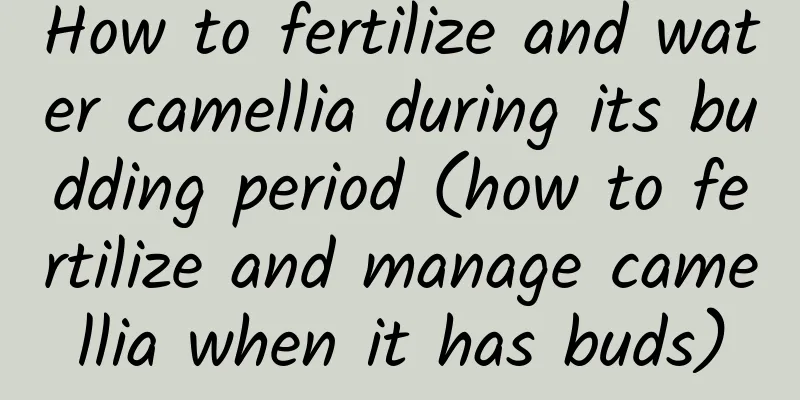How to fertilize and water camellia during its budding period (how to fertilize and manage camellia when it has buds)

1. Fertilization during flower bud differentiationIt takes several months for camellia to differentiate from flower buds to bloom. Flower buds begin to differentiate in early summer, May or June, and flowering does not begin until after October . Among them, the flower bud differentiation period, that is, fertilization in May and June is a very critical time, which is related to whether the camellia can successfully bud. May and June are the stages when vegetative growth and reproductive growth go hand in hand . Fertilization must ensure the balance of the three elements of nitrogen, phosphorus and potassium. Both chemical fertilizers and decomposed organic fertilizers can be used. For chemical fertilizer, use a balanced nitrogen, phosphorus and potassium fertilizer with a not too high concentration. The dilution ratio is 0.2-0.5%. For organic fertilizer, dilute it 10-20 times with cake fertilizer water and combine it with 0.2% potassium dihydrogen phosphate solution for foliar spraying. 2. Fertilization during the bud stageAfter the flower buds differentiate, the camellia buds grow slowly. After a summer of growth, they will open up in September and October in autumn. Fertilization during this period is mainly to promote the expansion of the flower buds. During this period, the main fertilizers used are phosphorus and potassium fertilizers. High-phosphorus and potassium fertilizers can be used with the same concentration of 0.2-0.5% as above. For organic fertilizer, it is recommended to use pigeon manure, chicken manure and other diluted fertilizer water with high phosphorus and potassium content, and fertilize once every half a month. Stop fertilizing after the flower buds show color. There is another important task at this stage, bud thinning. If there are too many camellia buds, it will affect the quality of flowering. Excessive buds should be thinned out, and generally one healthy bud is retained on each branch. 3. Fertilization during flowering periodCamellia blooms in winter and spring, and fertilization is generally not recommended during this period. If the buds do not open for a long time, excluding temperature, humidity and other reasons, you can spray potassium dihydrogen phosphate 1-2 times . A certain temperature and humidity must be maintained during the flowering period. If the temperature is too high, it will induce vegetative growth and affect flowering. If the temperature is too low, frost damage will occur. Generally, the average temperature during the flowering period is maintained at around 10 degrees. In addition, air humidity will also affect flowering. Dry air will cause the buds to become stiff and inflexible. The air humidity must be maintained at a certain level during the flowering period. |
>>: How to reproduce roses with a high survival rate (three common methods of reproducing roses)
Recommend
What brand of water-soluble fertilizer is good for cucumber flushing (what water-soluble fertilizer is good for cucumber yield)
Cucumber is a common vegetable on the table of co...
What is gourd?
What is gourd? The gourd is a plant of the genus ...
The efficacy and function of carambola
The efficacy and function of carambola Promote di...
Plant some bulbs in winter, and you’ll have flowers to enjoy during the Chinese New Year
Cyclamen Cyclamen, also known as rabbit ear flowe...
How to grow Anthurium hydroponically so that it blooms
Flowering of hydroponic anthurium If the hydropon...
Which month is the best to plant strawberries?
Strawberry is deeply loved by people for its brig...
Where are the best places to grow yellow pear?
Pear Planting Conditions Round yellow pear has go...
Where do mint seeds come from?
How to get mint seeds Mint seeds grow inside the ...
Is purple bamboo plum poisonous?
Can it be placed indoors? Placing a purple bamboo...
What flowers are suitable for growing in Chengde? What are the city flowers and trees?
1. Climate characteristics of Chengde Chengde has...
Summer cabbage planting time and method
Summer cabbage planting time Summer cabbage refer...
How to fertilize the money bag
Fertilizer usage: Money vines like to grow in fer...
Can sunflowers be placed indoors? Can they bloom indoors?
1. Can it be placed indoors? Sunflowers can be pl...
Where does the red spider lily grow?
The bulb of the red spider lily is nearly spheric...
What kind of insects are best treated with Avermectin?
Avermectin is a widely used agricultural or veter...









